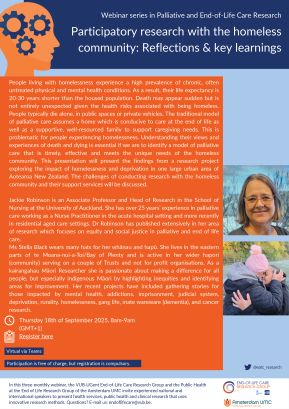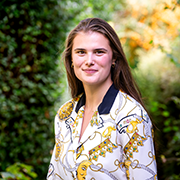Webinar series in Palliative and End-of-Life Care Research presents the webinar Participatory research with the homeless community: Reflections & key learnings on Wednesday 18 September 8-9 CEST.
People living with homelessness experience a high prevalence of chronic, often untreated physical and mental health conditions. As a result, their life expectancy is 20-30 years shorter than the housed population. Death may appear sudden but is not entirely unexpected given the health risks associated with being homeless. People typically die alone, in public spaces or private vehicles. The traditional model of palliative care assumes a home which is conducive to care at the end of life as well as a supportive, well-resourced family to support caregiving needs. This is problematic for people experiencing homelessness. Understanding their views and experiences of death and dying is essential if we are to identify a model of palliative care that is timely, effective and meets the unique needs of the homeless community. This presentation will present the findings from a research project exploring the impact of homelessness and deprivation in one large urban area of Aotearoa New Zealand. The challenges of conducting research with the homeless community and their support services will be discussed.
Jackie Robinson is an Associate Professor and Head of Research in the School of Nursing at the University of Auckland. She has over 25 years’ experience in palliative care working as a Nurse Practitioner in the acute hospital setting and more recently in residential aged care settings. Dr Robinson has published extensively in her area of research which focuses on equity and social justice in palliative and end of life care.
Ms Stella Black wears many hats for her whānau and hapū. She lives in the eastern parts of te Moana-nui-a-Toi/Bay of Plenty and is active in her wider hapori
(community) serving on a couple of Trusts and not for profit organisations. As a kairangahau Māori Researcher she is passionate about making a difference for all people, but especially indigenous Māori by highlighting inequities and identifying areas for improvement. Her recent projects have included gathering stories for those impacted by mental health, addictions, imprisonment, judicial system, deprivation, rurality, homelessness, gang life, mate wareware (dementia), and cancer research.
Slides of the presentation



